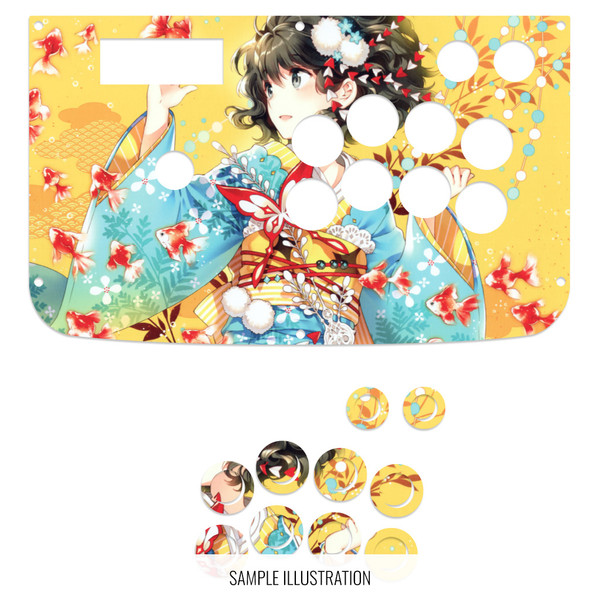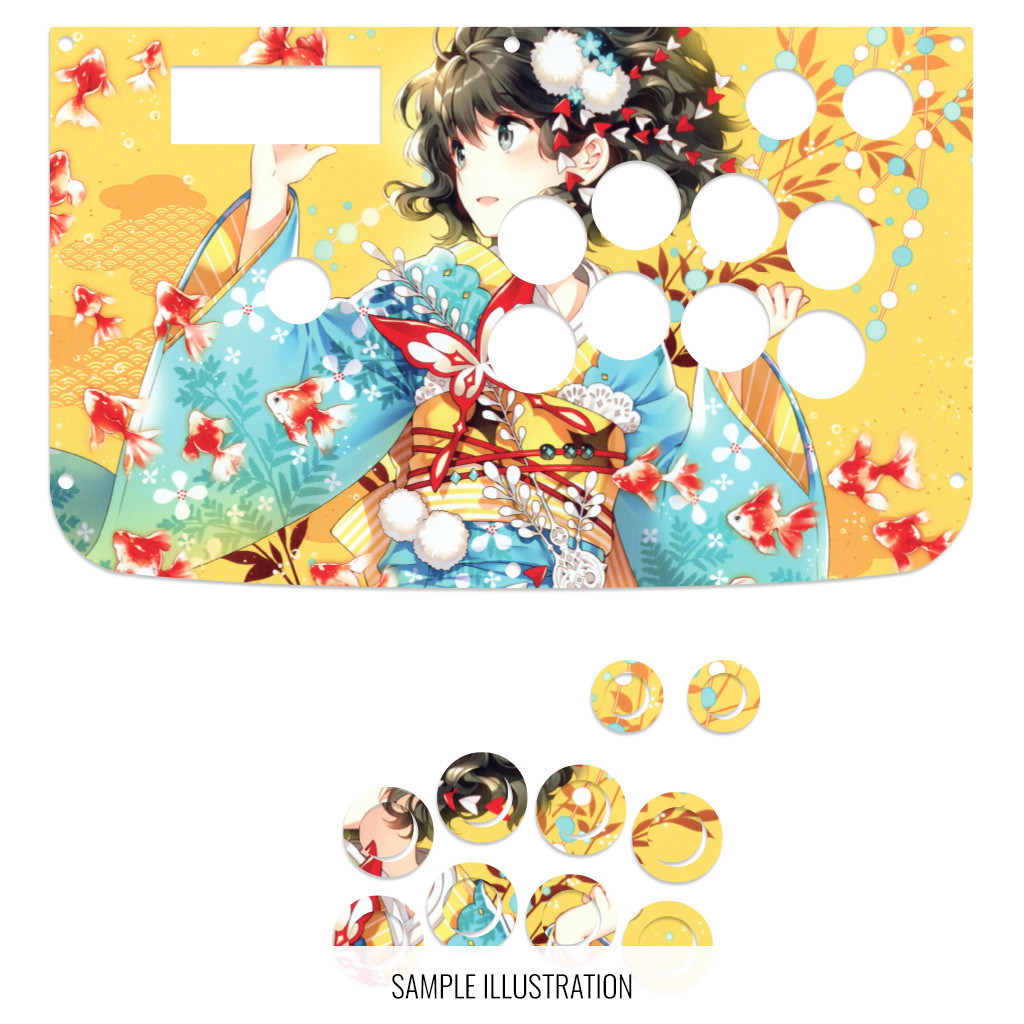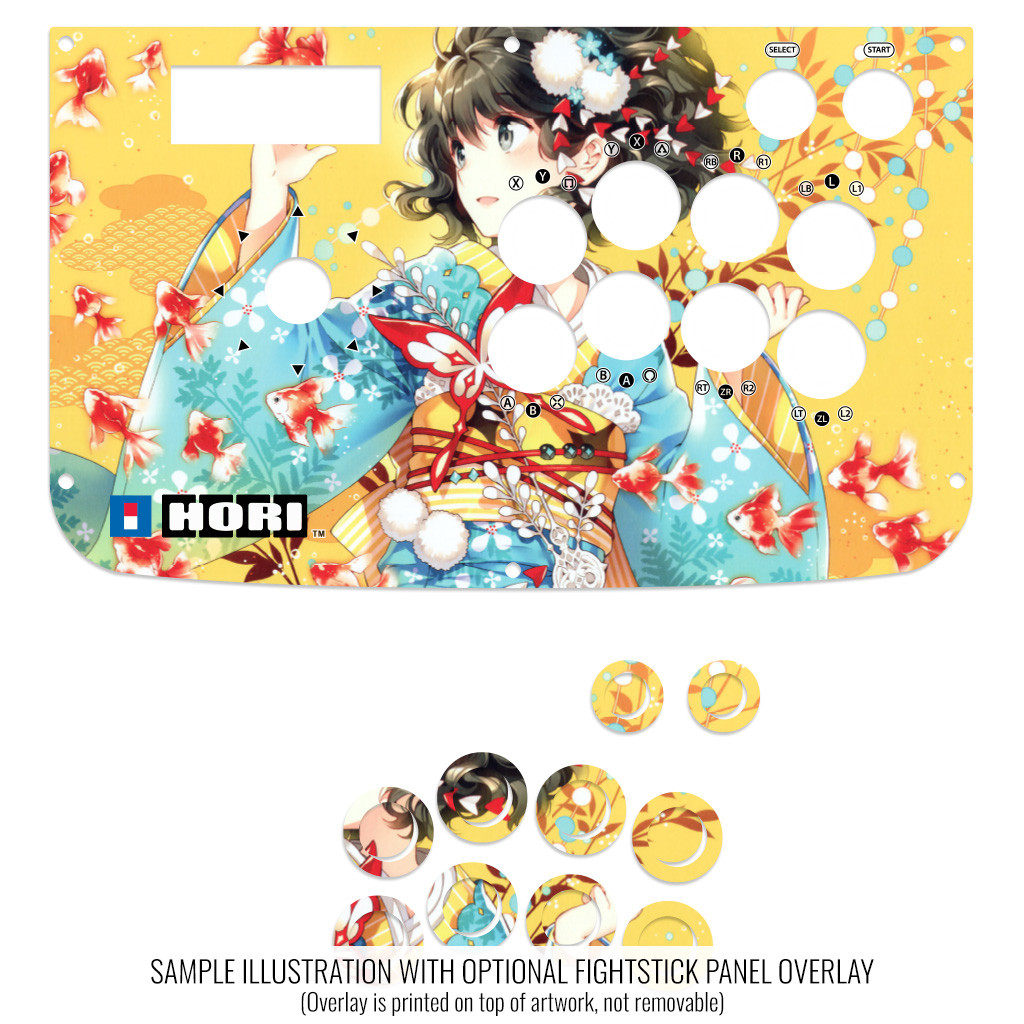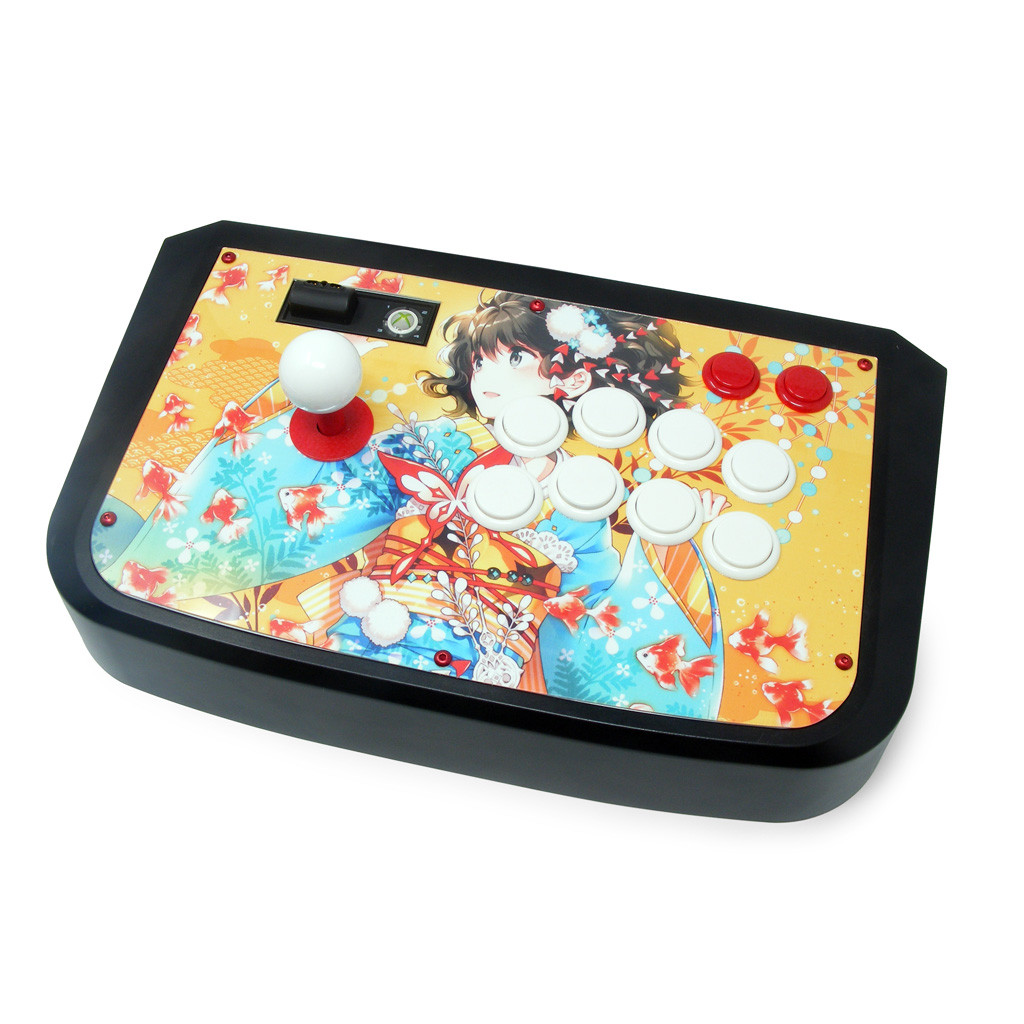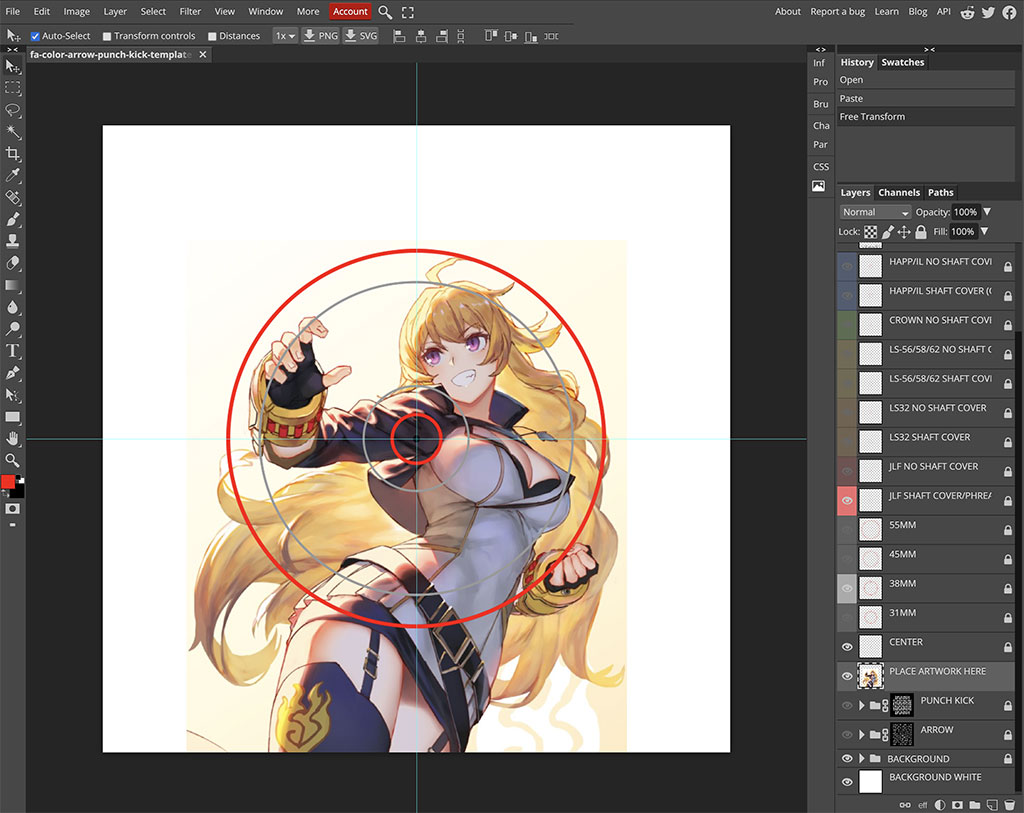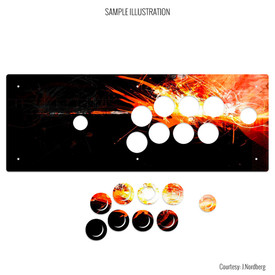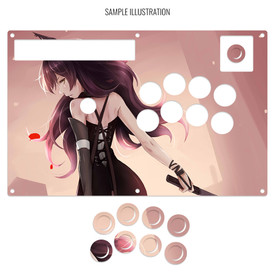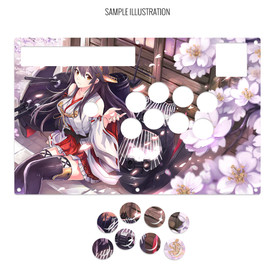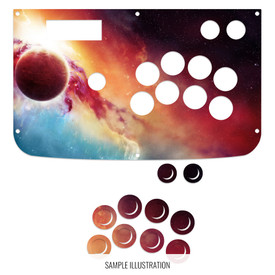- Category
- What's New?
- FightSticks/Pads
- Joysticks
- Pushbuttons
- Spare Parts & Tools
- Hardware & PCB
- Electrical
- Customize
- Merchandise
- Sales & Clearance
- Brand
Artwork Print and Cut for Hori RAP 3 Tekken Series (Kai)
Choose Your Options
-
Product Description
Please Read Before You Order
Below is important information to know before placing a custom order with us:
- Project L Official Artwork: Do not submit the PNG samples. Instead, please download the zipped Photoshop PSD version, unzip the file and integrate them into our artwork templates
 for your desired fightstick model
for your desired fightstick model - Custom Orders do Not Ship Separately: If you place an order for a personalized product along with non-custom products, such as arcade part or merchandise, please note that all items will ship together.
Control panel artwork represents one of the most convenient means to personalize your fightstick, giving it a new look almost immediately.
Designed for Hori Real Arcade Pro Tekken (Kai Layout) FightStick
Hori's Kai layout positions the joystick further left from the buttons. Please see the photos below to confirm if your model is a match or is similar in layout. If the layout or model does not match, then you may instead need the Artwork Print and Cut for Hori RAP 2/3/EX Panel.
RAP 3 Tekken Series Tekken 6 Pro 3/EX, TTT2 Prologue (Kai layout) (2Mb zip) Installation Notes
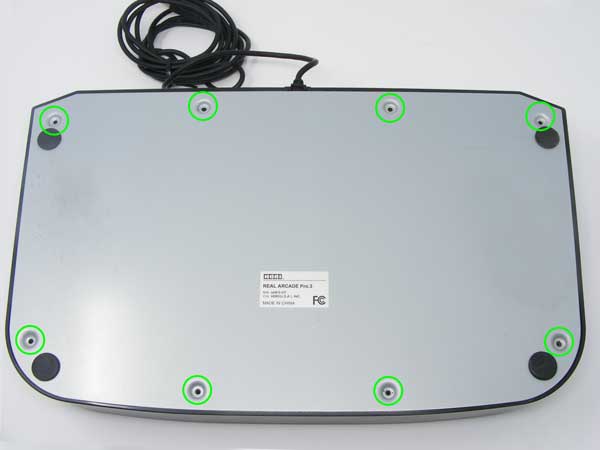
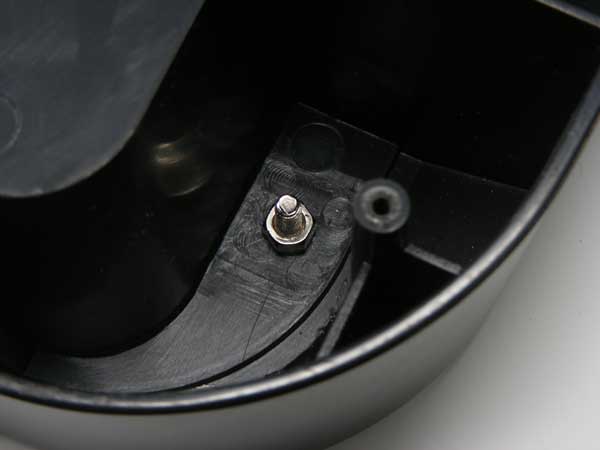
Accessing the control panel on Hori Pro 3's line of Fightsticks requires opening the case from the bottom. Eight small screws are located on the bottom metal panel. With the bottom panel removed, you will find six control panel screws held in place with 4mm nuts. Remove these screws, then lift the panel from the bottom to access the wires that tether the buttons and joystick to the motherboard. One way to remove the screws is to use needle nose pliers to access and loosen the nuts, as the screw has a square shape underneath the pan head to keep from rotating.
It is important to keep a written note of the wire colors for each button. When the buttons and joystick are freed from the panel, you will proceed to remove the original artwork using a heat gun or hair dryer to loosen the adhesive. Any remnants of adhesive can be removed using alchohol, WD-40, or GooGone. Allow the panel to dry fully and remove all residue before installing artwork and plexi.
If you choose not to purchase the Buttercade Top Loader for Hori Real Arcade Pro to install and swap artwork and plexi from the top panel, you can use the original screw and nut combination. One potential way to keep the artwork and plexi in place while reinstalling the original screws is to first place the buttons onto the panel, allowing the pressure from the button to secure the plexi and artwork. Next, reattach each of the buttons and joystick to its corresponding wiring, place the panel onto the case, then flip the case upside down. One by one, reattach each screw to the panel by slipping it into the hole from the control panel top. you may need to re-adjust the position of artwork and plexi before fully tightening the nuts that hold the screws to the panel.
If you decide to purchase the Buttercade Top Loader for Hori Real Arcade Pro, below are further instructions to install.
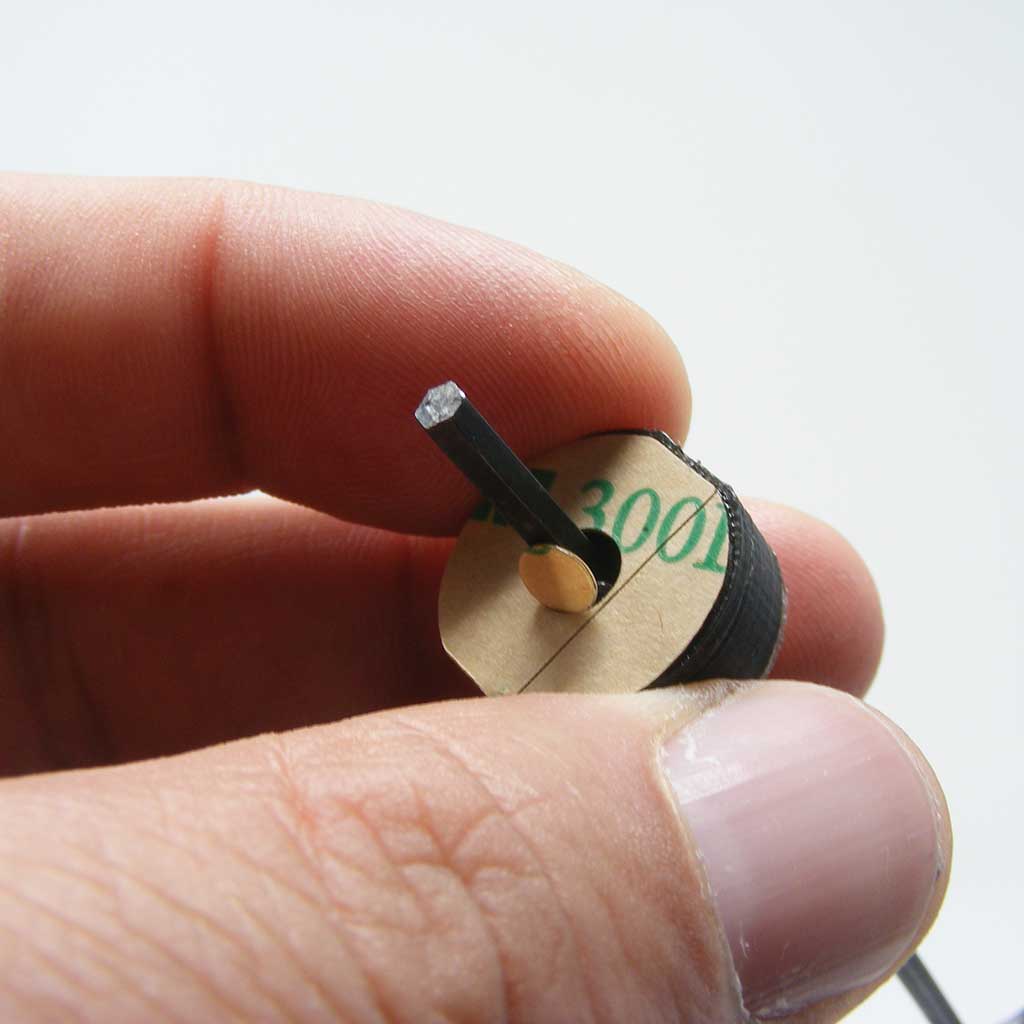
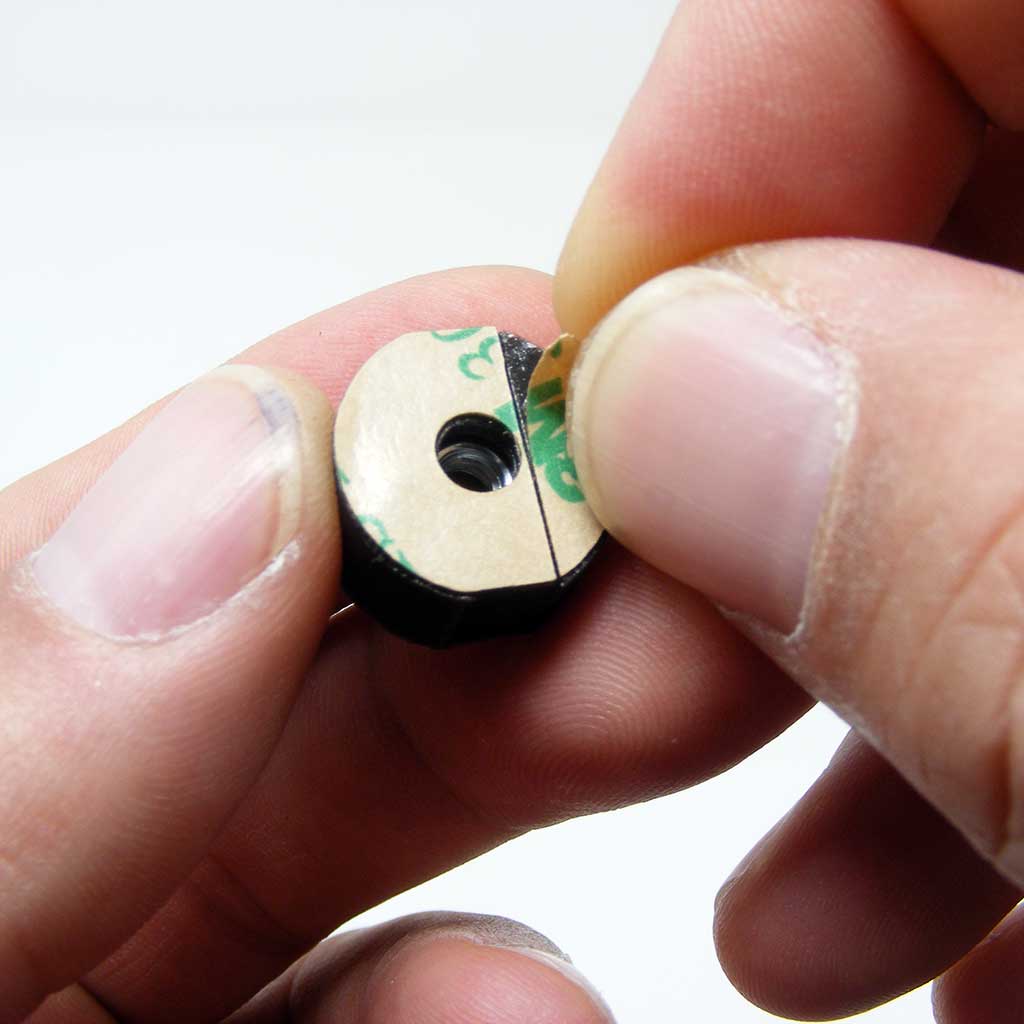
Each top loader has a double sided adhesive, which is covered by paper backing. A slit is cut onto the backing, which allows you to peel away the backing while the adhesive remains on the loader. Occasionally the process we use to cut the backing may have a piece of the adhesive remain over the loader's hole where the nut is positioned. You can take a small pointed tool to poke the adhesive from the backing and throw it away. The pointed tool may also clear any imperfections in the 3D printing that have occurred above the metal nut that is housed inside. Use your fingernail to catch one part of the backing and peel away. If you notice that some of the adhesive lifts from the loader and remains on the backing, push the backing down onto the loader, and then re-attempt to peel away, taking care not to grasp the adhesive along with the backing. 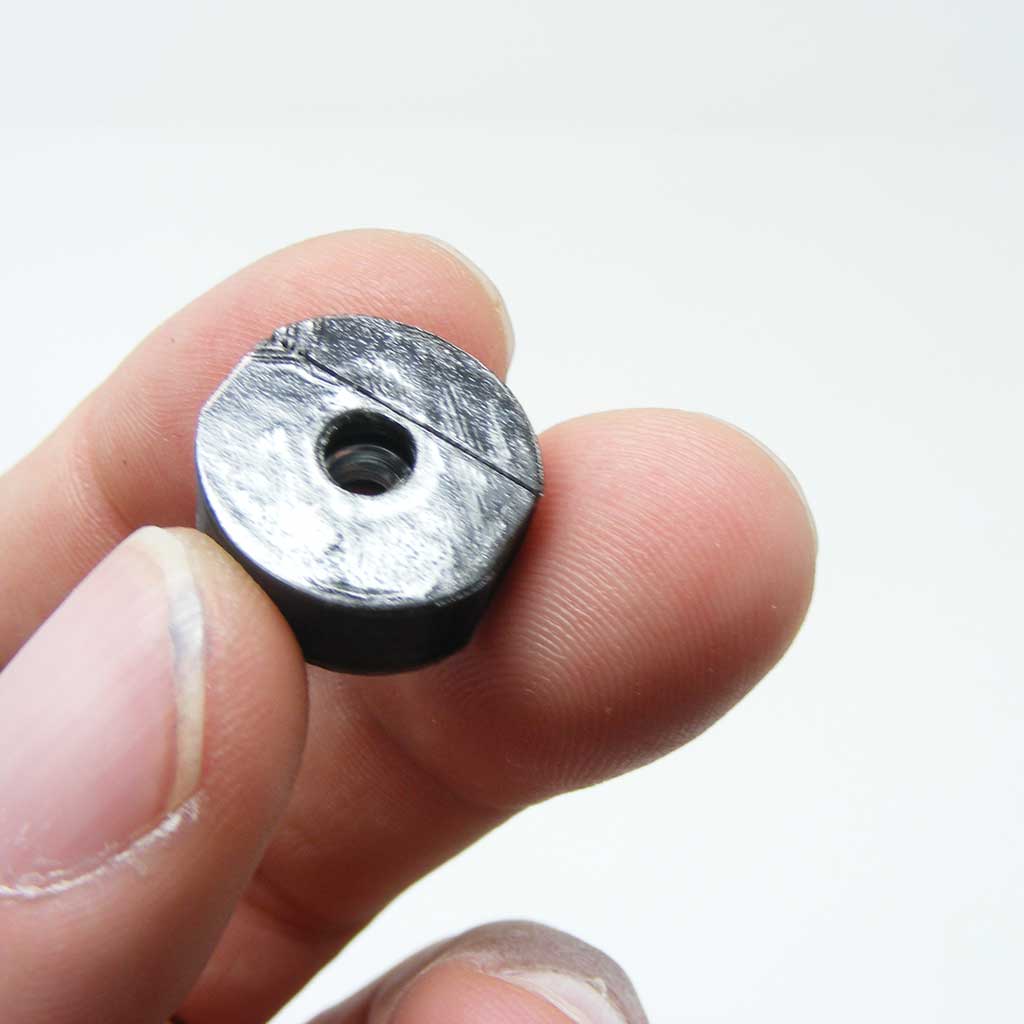
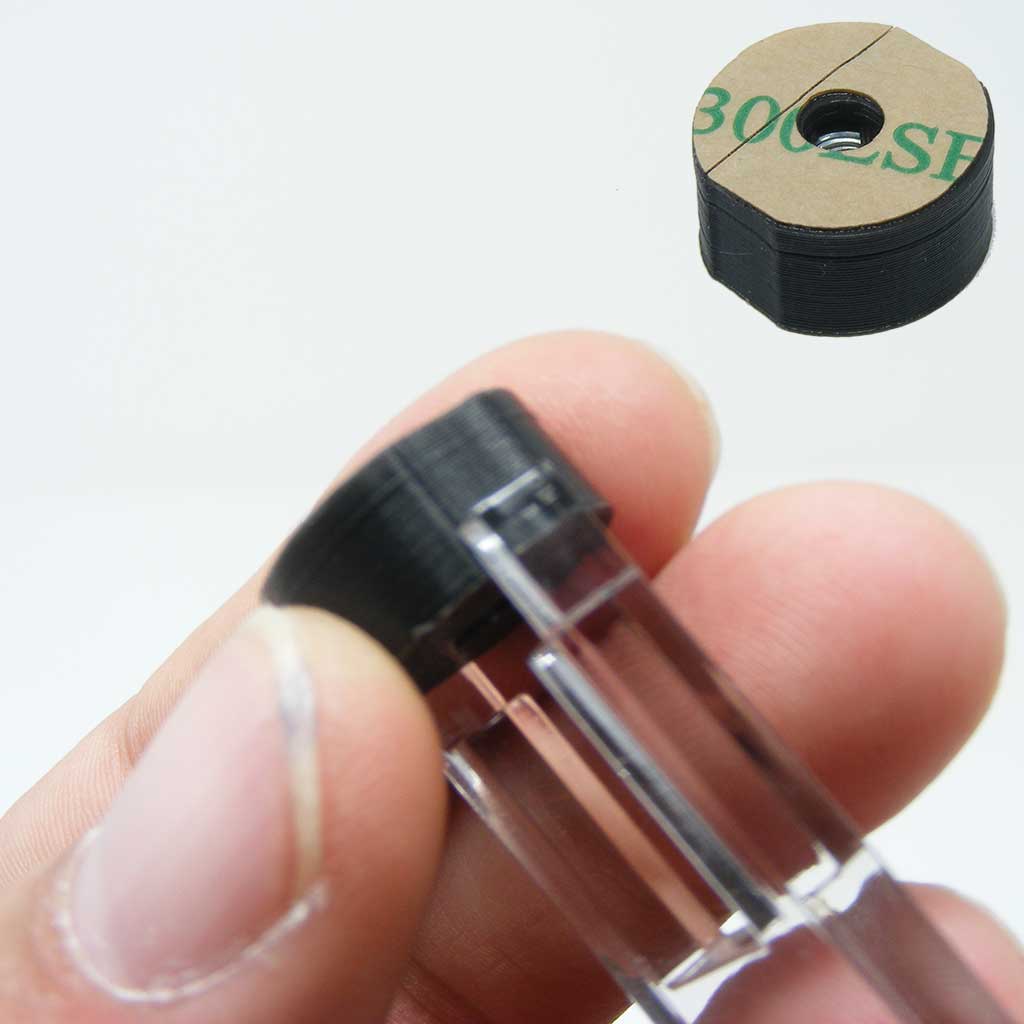
After peeling one side of the top loader adhesive backing, peel the next side to expose the entire surface. It should look like the above photo, with the adhesive displaying a glossy surface. Please note that very small portions of the adhesive's edge may stick to your fingers as you handle it. The top loader has a shallow groove on each side. Slide the top loader handle upwards from the bottom of the top loader until the handle's narrow opening sits on the bottom of the loader. 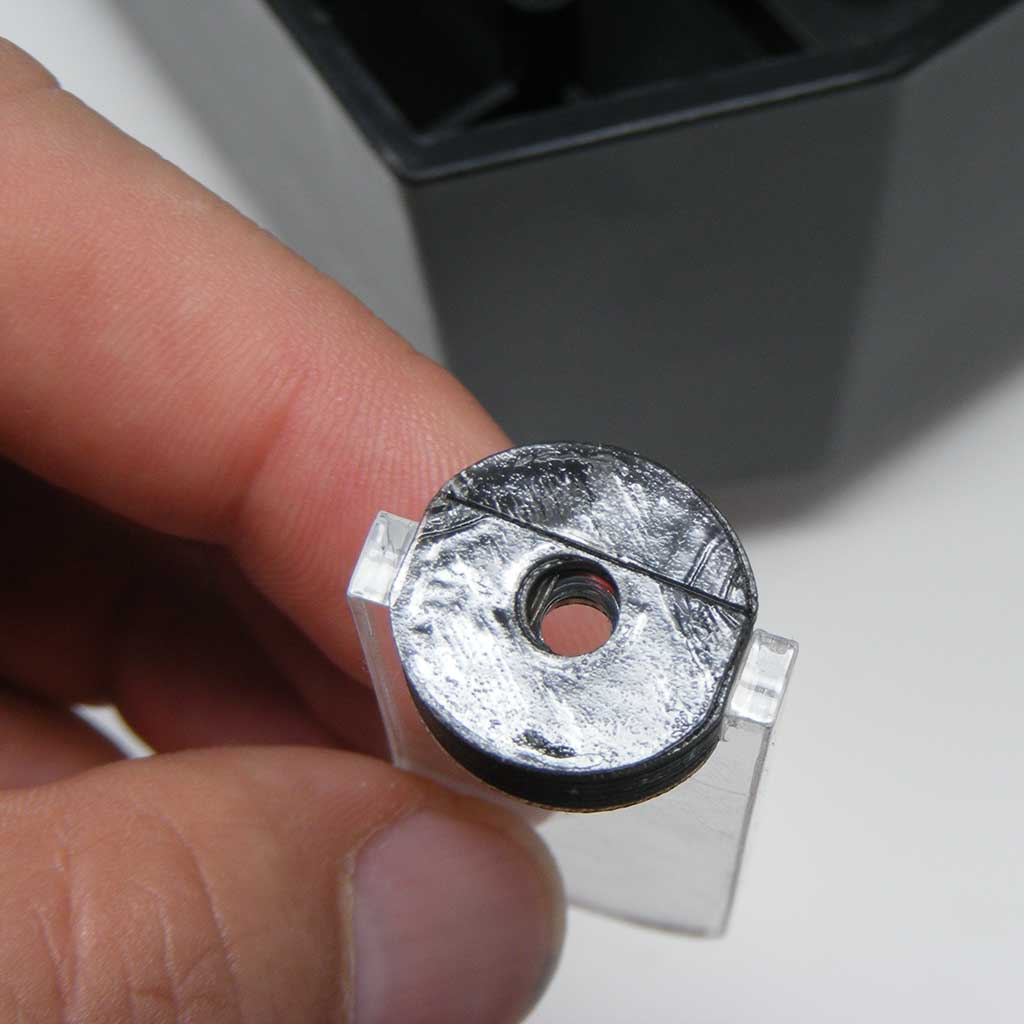
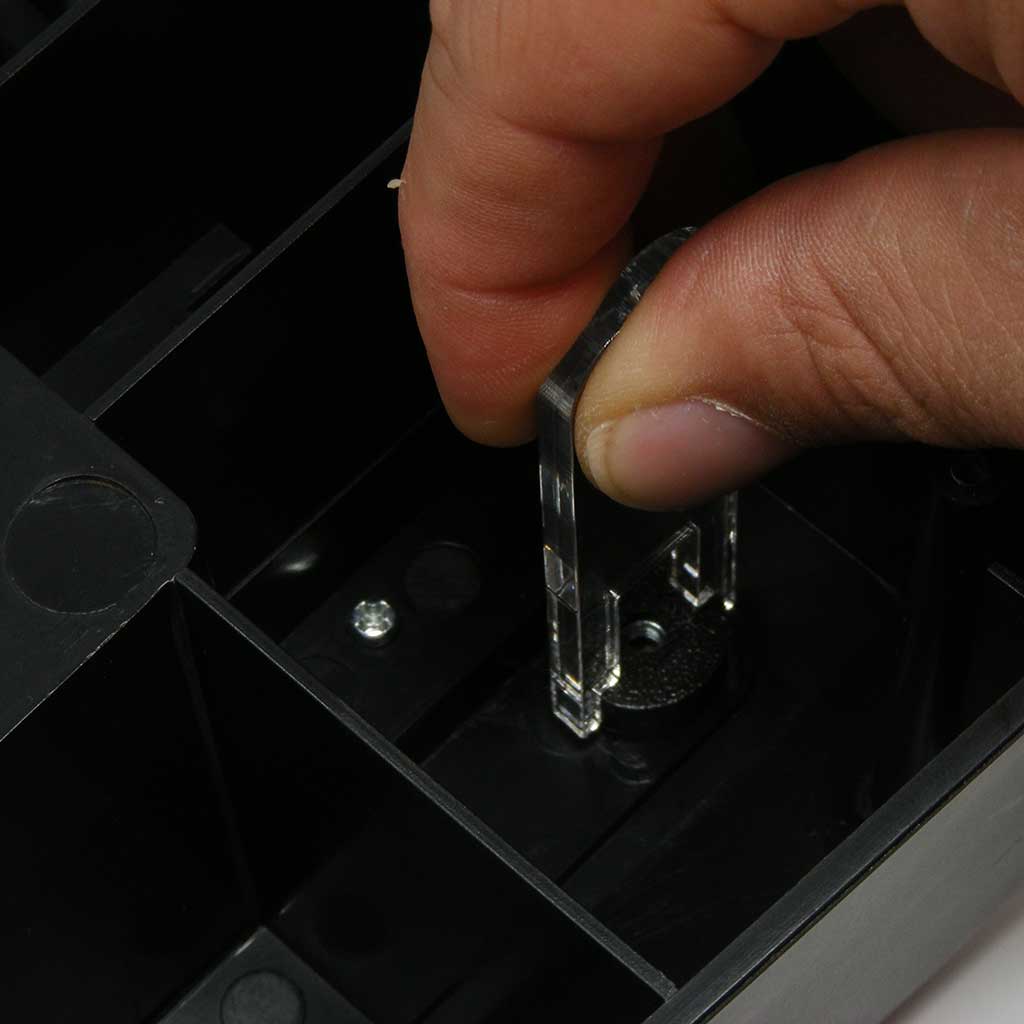
The handle should grip around the loader, allowing you to lower it into the HRAP's body. From the example above, the top loader should appear like this on the handle. Please note that due to the variability of a 3D print, the loader handle may grip tighter or looser around the shallow groove on each side of the top loader. With the top loader on the handle, position the loader to the open screw hole on the HRAP case's plastic underside. The goal here is to get a clear an opening as possible that should line up relatively close to the plexi and artwork's own screw holes, which you will install later. One way to accomplish this is to place the plastic case on an open surface where you can easily see the original screw hole through the loader. You can also place the case upright to see through the front of the case's square-shaped screw hole as you place the loader in the back.
Lightly apply pressure to the loader using the top of the handle between your thumb and forefinger, with the intent to check the spacing of the loader before committing to its final position. If you find that the loader is off position (the top loader's screw hole is clearly offset from the center of the case's square hole), you can attempt to pull the loader out, replace on the handle and try again.
Once you have the screw hole on the top loader relatively centered with the square hole of the case, apply as much downward pressure to the handle as you can to secure the top loader's adhesive to the plastic.
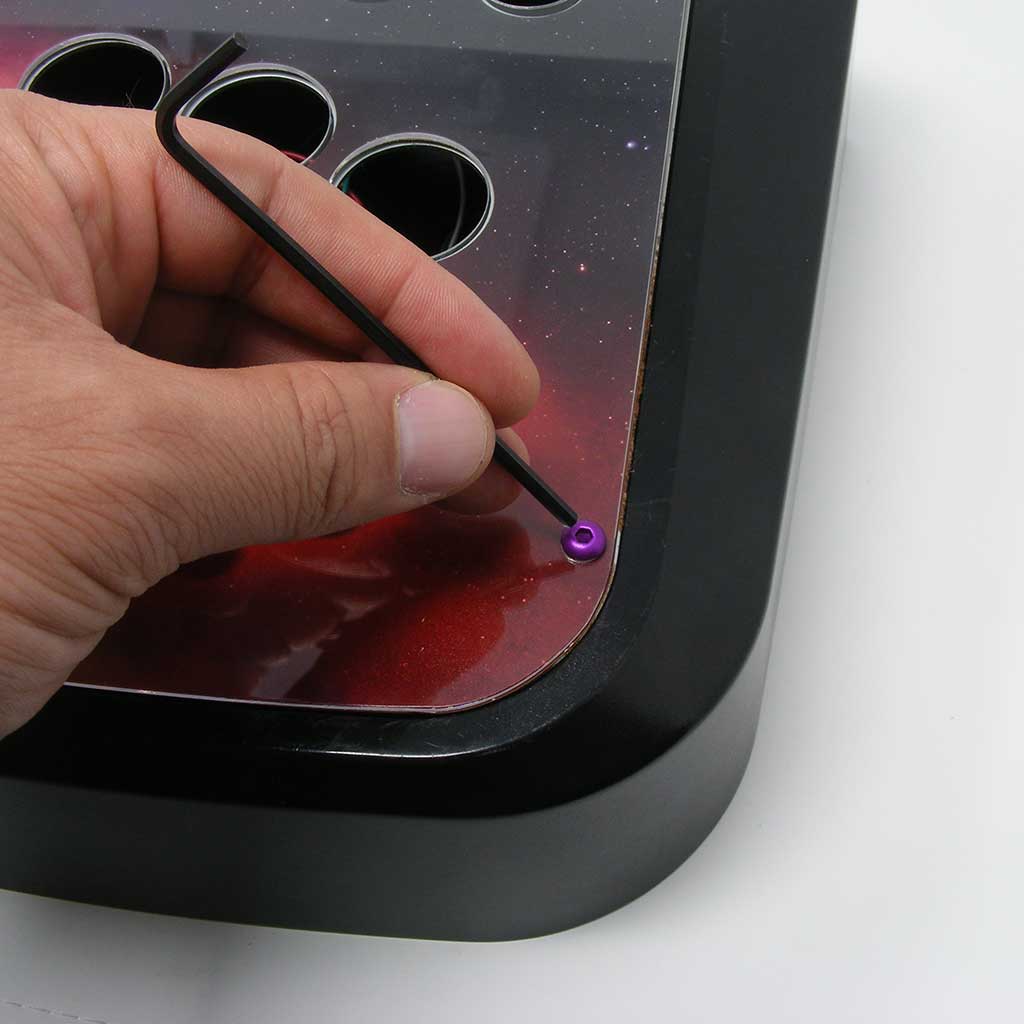
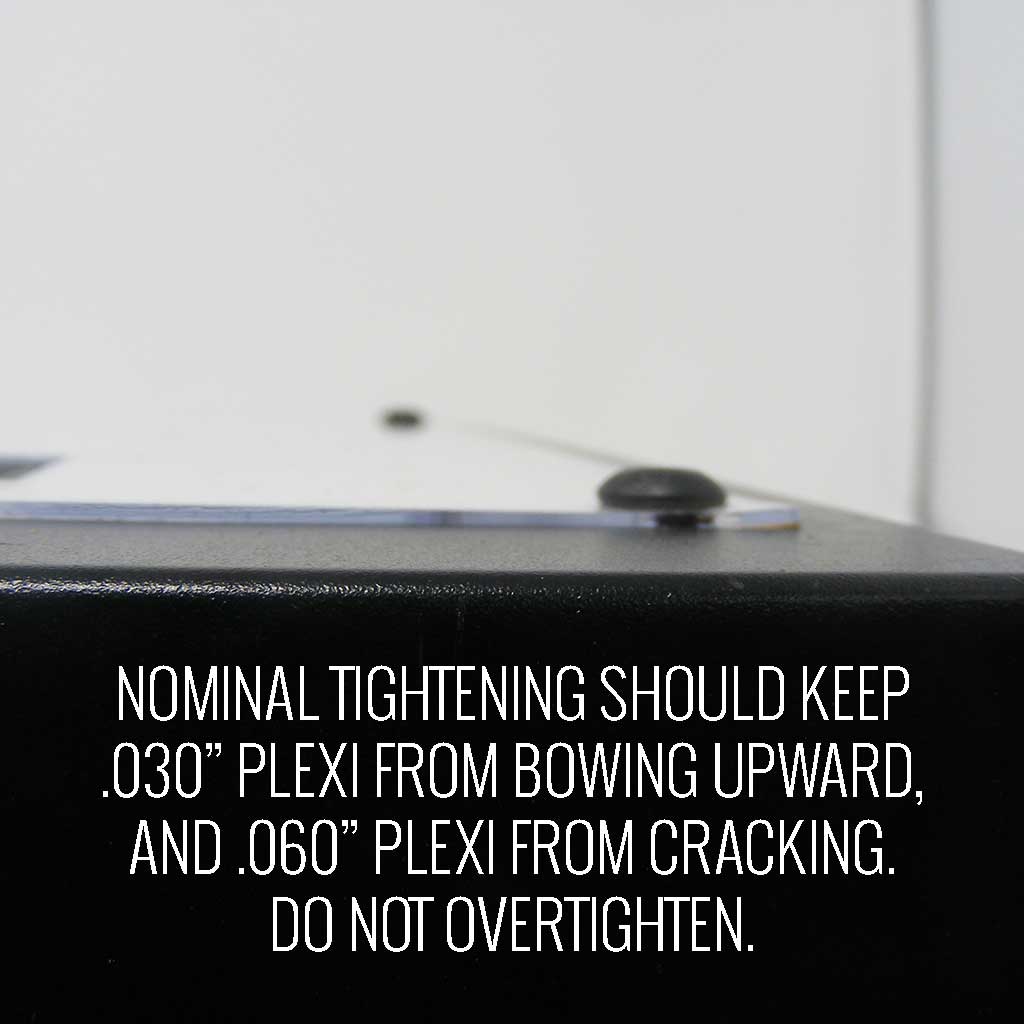
We offer M4 hex screws in several colors to customize your HRAP 3 artwork or plexi install. The screw uses a 2.5mm kex key. It is important to note that the original HRAP 3 screw was designed to fit into the square hole. Additionally, the HRAP 3 was not designed to accomodate custom plexi. This means that the artwork and plexi may shift around until you secure it with the screw. Position the artwork so that it lines up with the edges of the metal panel, and centered around the buttons. That may require you to grip your fingers between the plexi and artwork and move around until all positions look correct, then screw down.
When installing the screws, please screw down lightly at first so you can make any corrections to the artwork and plexi position. Do not force the screw in hard, as the this does not allow the screw to catch the top loader's threading and may dislodge it. Instead use the hex key to screw into the top loader's opening. It should tighten once the threading catches. Occasionally a small piece of the 3D printed plastic may obstruct the metal screw nut. You can use a small pointed tool to clear that debris from the opening.
Finally, when screwing in to secure the artwork, you should feel the screw tightening around the top loader's metal nut. This will improve the adhesive bond. Do not tighten too much for risk of cracking the acrylic, especially should you choose the thicker and less flexible .060" plexi. Tightening too hard will also cause the thinner .030" to bow around the back and around the control panel, where the acrylic's surface area is narrower.
High Resolution, Color Fidelity
Artwork prints are developed using a top-of-the-line commercial printer, offering vivid, professional-quality artwork replication. The printer is capable of resolution of 1200dpi (dots per inch), and 8 color ink system (Cyan, Magenta, Yellow, K(Black) + Light Cyan, Light Magenta and White) reproduces artwork over a wide color range.
Artwork is printed on 10 mil cardstock sheet. It carries 95% brightness and tensile strength of 100 pounds per inch.
Each print is laser cut to your specifications, as presented by available options. You will receive the print with perforated button inserts designed to fit your chosen button brand. In some cases, such as the Mayflash series, the control panel elements may also have perforated cuts. Gently press downward to remove the cutouts.
Important Notes about Color Fidelity, Brightness
- Please do not change the RGB color space of our templates to CYMK when submitting your artwork. Our templates are intentionally designed in the RGB color space to best match most customer's screen expectations, and will typically convert CYMK to RGB when printing. We will not honor demands to reprint artwork whose template is changed to CYMK color space.
- Unless properly calibrated to your printer and viewing environment, your monitor does not accurately represent the brightness of paper. Artwork submissions may need adjustment to ensure prints are not too dark. Please read this helpful support article for more information
New: Holographic Paper

Example animated photo displayed for illustrative purposes only. Pattern "Space Dots" shown.
In addition to white cardstock sheets, we now offer holographic paper sheets in several captivating patterns. Holographic sheets are created from paper that is imprinted or embossed with a design or image and then covered in a thin, transparent film of metal. The finished sheet has a characteristic luster — a kind of rainbow iridescence — when the imprinted pattern is viewed from particular perspectives.
Holographic cardstock has a similar tensile strength to our existing cardstock, about 110-115 pounds per inch
How does an artwork's colors change the holographic effect in a print?
If you are choosing to print your artwork using our holographic paper instead of white paper, it's worthwhile to know how how elements of color in your illustration will affect the appearance of the holo effect.
The ink used in our printing is transparent. This means that the holographic effect will indeed reflect its pattern differently under that transparent ink color. Typically it will reflect the holo pattern under that color, as opposed to displaying its own color-changing effect.
Solid black and darker colors typically have more ink laid onto the holographic material and thus is the least transparent. Areas of white within an illustration will use no ink, and thus reflect the full color changing spectrum of the holographic paper. Here is one example of both transparent ink, areas of white, and solid black ink on a holographic print:
https://x.com/Narath_FGC/status/1828365042095415660
Another example shows how the effect appears when the material is shifted from side to side (click the link to see the video example):
https://x.com/Patches23X/status/1829260992532164834
Differences between White Cardstock and Holographic Print
Both materials have their strengths. White cardstock is our tried and true paper material, producing vibrant colors with a textured semigloss. It's 95% brightness brings out the best color fidelity because it has a white backing.
Holographic paper has a striking metallic finish. By itself, its color changing properties are quite eye-catching. This is even more evident when a pattern is used. However, because the material does not have a white backing, the illustration's areas of white will instead show the metallic sheen. This can lead to a slightly duller appearance compared to cardstock. These comparison photos may help to illustrate. Please note that while the colors can appear more muted on holograph paper, the reflective nature of the material as well as its color properties will vary depending on the angle the illustration is seen and the material's pattern. Not every print will exactly resemble the below example.
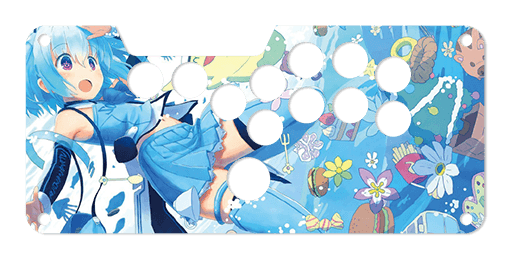
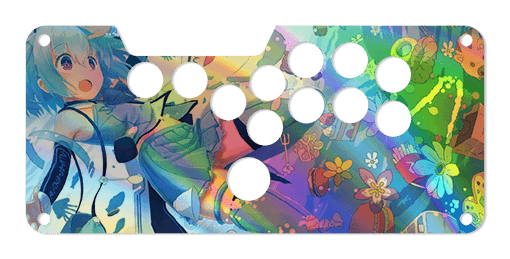 White cardstockHolographic paper
White cardstockHolographic paperNot Every Artwork is Suitable for Holographic Paper
Artwork with low contrast - meaning an image or appearance where there's a small difference in brightness or color intensity between different areas - may not output well on holographic paper. As mentioned, colors can appear more muted than on white paper. This is partly due to the reflective nature of the material and its metallic sheen. Holographic paper is not white.
No refunds, reprints for artwork whose holographic pattern isn't desired.
We attempt to provide as much information about the holographic material as we can. We do not know how your artwork will turn out on thsi material until it is printed. We do not provide consultation on those prints - we simply print on the material that you chose. No refunds or reprints are offered under these circumstances. Chargeback threats will result in a blacklist from our store under your current account.
White or Holographic Paper: Not sure Which to Choose?
If you are unsure or unconfortable choosing holographic paper for your artwork, we recommend that you consider this suggestion:
Since launching this new material, we found that many requested their artwork printed on both white and holographic paper. It provides an opportunity to compare the two materials, while ensuring that should holographic material not suit the artwork well, the artwork on white paper is a good backup.
Holograph Patterns
The following patterns are available. Artwork is printed atop the pattern and its color changing effects will appear underneath. Please note that the animated patterns are simulated, meaning that the color movement displayed here may appear different when viewing an actual print from different angles. It's important to know that your illustration's colors will affect the reflectivity of some patterns. Darker colors or black will display the least color-changing effects, as black ink is mostly opaque. Lighter colors will reflect the most of the color-changing effects. Areas of white receive no ink when printing, and therefore will show the reflective pattern most of all.
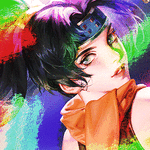
No Pattern (Rainbow)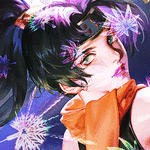
Cannabis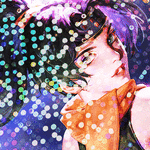
Donuts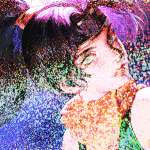
Dots Lite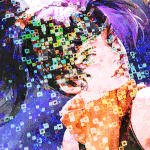
Little Boxes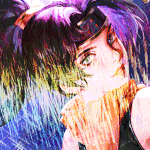
Magnetic Fur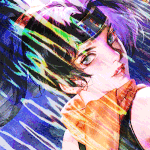
Moon Lava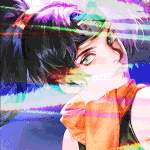
Pillars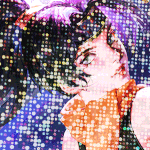
Space Dots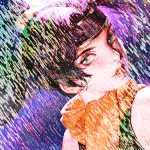
Static Storm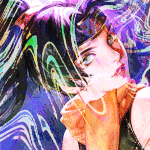
Swirl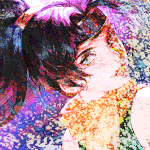
Texture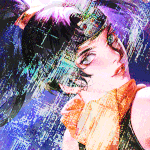
Thatched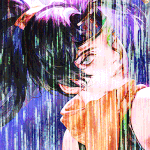
Tinsel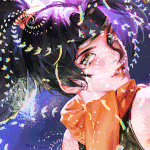
VortexOption Guide Often, you will have several options to personalize your control panel. Note: Not every option will apply to your Fightstick model.
Layout Configuration
Each Fightstick has its own characteristics, with some sharing similar elements, such as the popular Vewlix button layout. We will specify what options are available for each Fightstick. Below are the most common button layout configurations:
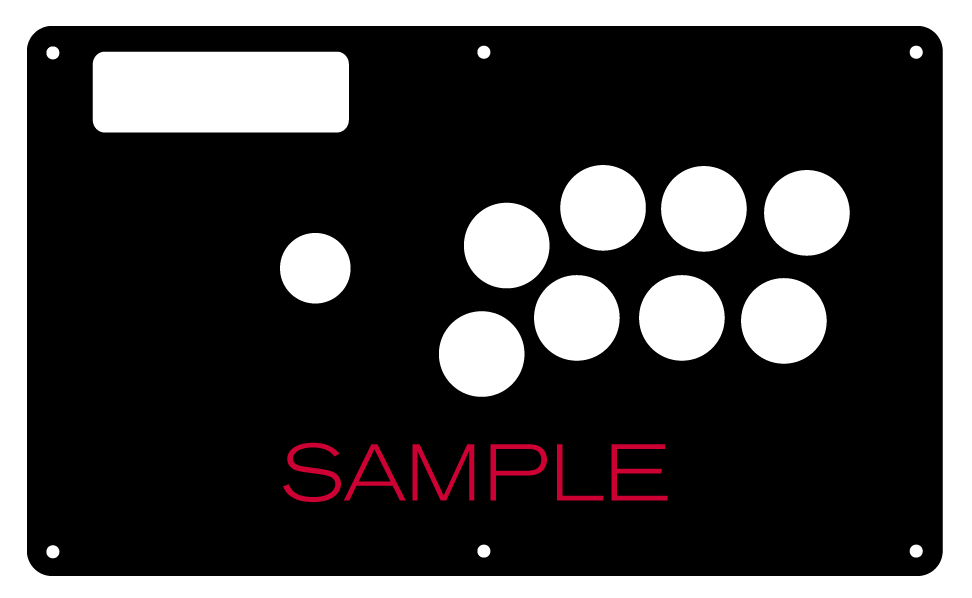
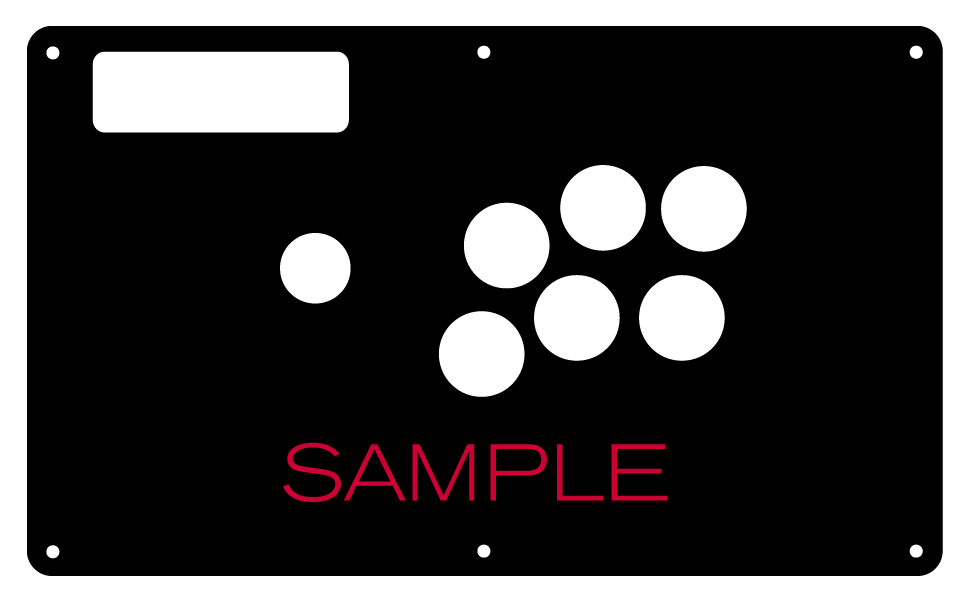
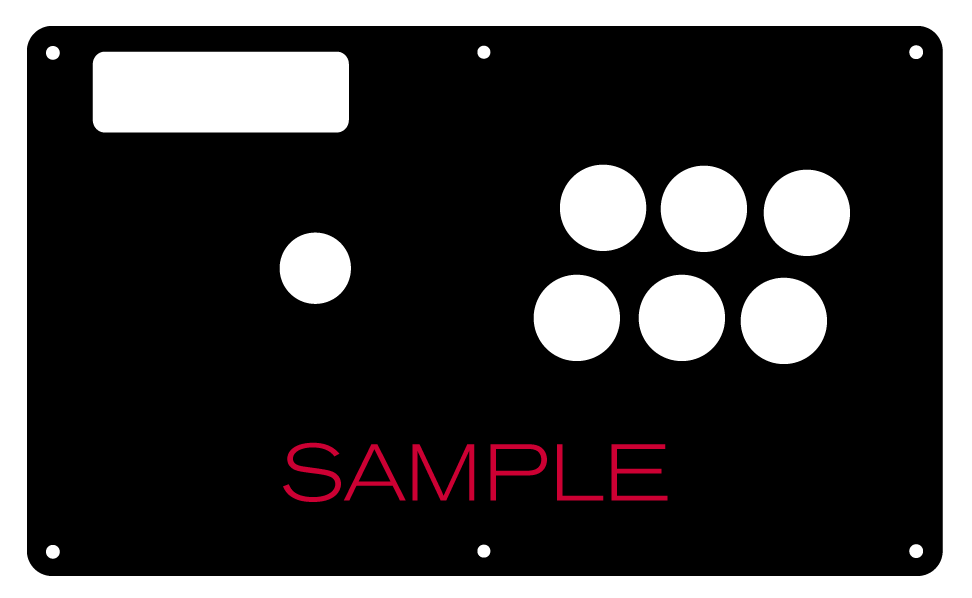
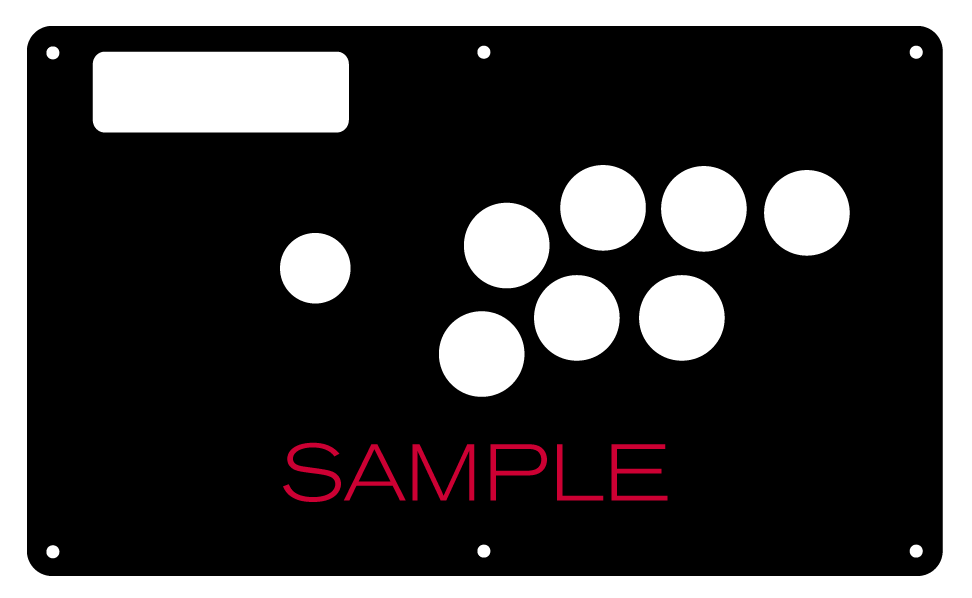 8 Button VewlixFirst 6 ButtonsLast 6 Buttons7 Button Vewlix
8 Button VewlixFirst 6 ButtonsLast 6 Buttons7 Button Vewlix
Removing Default Elements
Some Fightsticks, such as the popular MadCatz TE, offer additional personalization options by removing default elements such as control panel, start button, or screws. Cut options are defaulted to their authentic counterpart, displayed as [YES (default)] in the options list. For example, a MadCatz TE, the default configuration is to have the turbo/guide portion of the control panel cut, so that the control panel can fit properly. You have the option to select [NO] to prevent cutting these areas.
![Cut Control Panel? [NO]](http://support.focusattack.com/attachments/token/ioB7e1jzIXfxKdM8KJPKKzvKD/?name=sample-8button-noturbo.png)
![Cut Start Buttons [NO]](http://support.focusattack.com/attachments/token/SWbsx5sVHYupnBQ5iuZH1S2HK/?name=sample-nostart.png)
![Cut Middle and/or Bottom Screws? [NO]](http://support.focusattack.com/attachments/token/QzFj5pc5cNNHkOKrzlEMcc0I4/?name=sample-8button-nomiddlescrew.png) Cut Control Panel? [NO]Cut Start Button? [NO]Cut Middle and/or Bottom Screws? [NO]
Cut Control Panel? [NO]Cut Start Button? [NO]Cut Middle and/or Bottom Screws? [NO]
Cut Control Panel? [NO] - If you own a MadCatz TE, and installed a PS360+, you may no longer need the Turbo/Guide area of the control panel, located at top left. This option allows you to remove the Turbo/Guide portion. Please note that you MUST remove the actual control panel on the TE by unscrewing it before applying the plexi, or you risk damaging the plexi. Also, please make certain to select this option if you are also choosing to have artwork printed, or the plexi and artwork won't match.
Cut Start Button? [NO] - On some joysticks - such as the Qanba Q4 - the start button is directly on the panel. You can select to have this removed. You can also select this should you desire a panel similar to the Eightarc Fusion or Synthesis series Fightstick, as the start button is moved elsewhere. Again, this option is available on specific joysticks.
Cut Middle and/or Bottom Screws? [NO] - Selecting "no" on this option allows you to remove the middle top and bottom screw holes on specific joysticks, either for a cleaner appearance or to avoid rubbing your wrist against the screw. Please reconsider this option if you intend to have a full panel etch on your plexi, as etching physically changes portions of the plexi due to heat. In this case, it is best to leave the screw holes in place in order to keep the panel securely positioned.
Cut Button Inserts

Pushbutton manufacturers such as Sanwa, Seimitsu, Crown and GamerFinger have each produced specific models with a clear or translucent plastic cap and flat plunger. These are often used to display a graphical insert, allowing you to enhance the button's appearance. That said, each button manufacturer has designed the artwork cap with a different diameter than their competitors. For example, GamerFinger's artwork cap has a diameter that is slightly larger than Seimitsu or Sanwa. An insert cut for a Sanwa artwork cap will fit loosely when inserted into the GamerFinger artwork cap. This is an undesirable result that can produce a white or colored ring around the insert.
Now, you can choose the button insert cut to match the pushbutton you intend to use. This allows the insert to fit snugly within the cap.
Brands and Model with Artwork Caps
- Sanwa - OBSC (30mm) | OBSC (24mm)
- Seimitsu - PS-14-GN-C (30mm) | PS-14-DN-C (24mm) | PS-14-K (30mm) | PS-14-KN (30mm) | PS-14-DN-K (24mm)
- Seimitsu - ALUTIMO SSPS MX 24mm and 30mm
- Crown - SDB-201-C, SDB-202 MX (30mm) | SDB-202-MX (24mm)
- Qanba - GRAVITY 24 and 30mm
- GamerFinger - HBFS30 (30mm) |HBFS24 (24mm)
In some instances, a button brand or model does not have a 24mm equivalent with art cap. In this case, we will cut to the default size of Sanwa 24mm insert.Please note that if you later intend to purchase a different button, you may need to get new button inserts or new artwork. If you are uncertain which button you may choose, Sanwa is chosen by default.
Button Cut for Qanba Q2 Glow
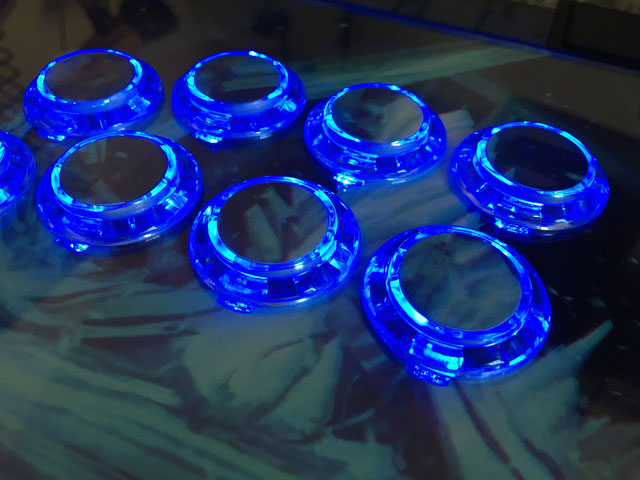 Qanba Crystal and Q2 Glow feature buttons manufactured by Qanba. These buttons have a smaller cap diameter, and thus require a smaller artwork insert. If you plan to keep the Qanba Crystal or Q2 Glow buttons installed when updating your artwork, please choose the option "Crystal/Q2 Glow".
Qanba Crystal and Q2 Glow feature buttons manufactured by Qanba. These buttons have a smaller cap diameter, and thus require a smaller artwork insert. If you plan to keep the Qanba Crystal or Q2 Glow buttons installed when updating your artwork, please choose the option "Crystal/Q2 Glow".24 vs 30mm
When processing orders, a frequent mistake we found among new players is choosing the wrong size for action buttons, such as punch and kick.
Within the fighting game genre, Japanese arcade buttons commonly consist of two diameter sizes: 24 millimeter and 30 milllimeter (mm). In most configurations, 30mm represents your action button. These are front facing, appearing most prominent on your Fightstick control panel. Option button, such as "Start", "Select", or more recently "Option", "Touch", or "Share" are usually 24mm.
UPDATE: Owners of Neo Geo AES Joysticks will need 24mm pushbuttons instead of 30mm (Thanks SRK's DEZALB)
Below is a visual representation of a common Fightstick control panel. Throughout this article, we will mark 24mm in green, and 30mm in Orange.
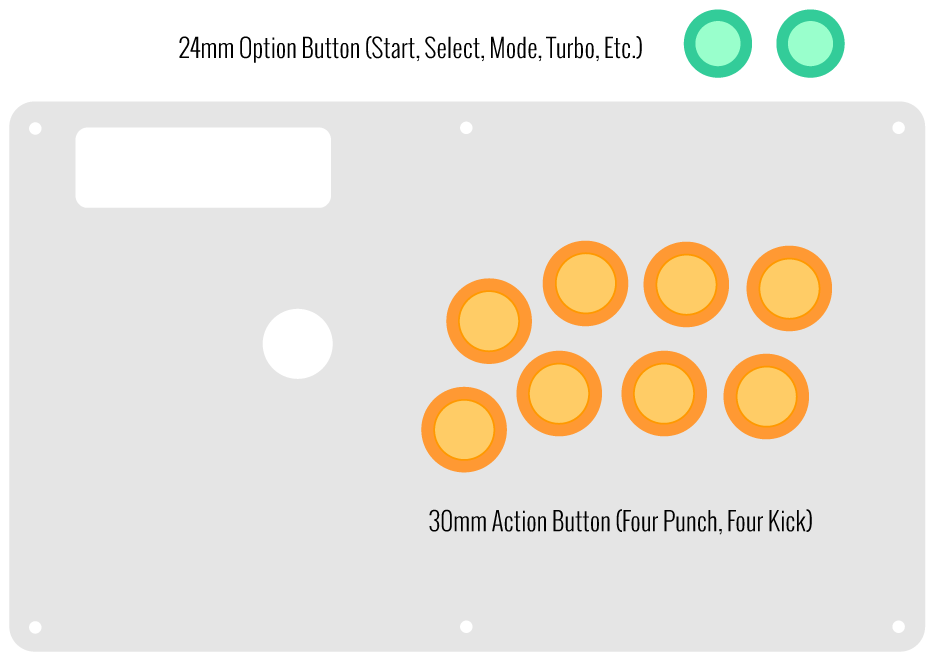
Checking the Proper Size
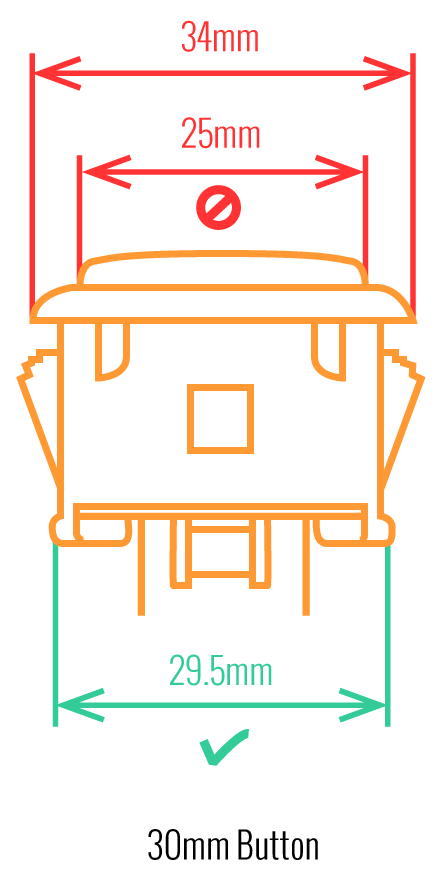 Another way that players can misinterpret the pushbutton size is by measuring the pushbutton plunger. Have a look at the diagram at right.
Another way that players can misinterpret the pushbutton size is by measuring the pushbutton plunger. Have a look at the diagram at right.The plunger - the part that you press down to represent an input - is 25mm or a bit smaller in most 30mm pushbuttons. Often this leads to the conclusion that one needs a 24mm button and not 30mm.
Similarly measuring the button rim can lead to confusion, as it is intentionally larger than the button hole it is placed in. You don't want to use these measurements. Instead, review the button housing diameter, or the hole the button will be placed in. You can do this with a caliper - a digital caliper is often quite helpful for this and other arcade-related projects.
Control Panel Configuration
Most Fightsticks from MadCatz, Hori, Qanba, and similar will use these two sizes. How the buttons are used will depend on the model joystick that you own. Over time, we'll provide example configurations for specific popular Fightstick models and arcade cabinets using the color key for 24mm (green) and 30mm (orange). We'll also expand the key for future models if another size is introduced, and we offer for sale.
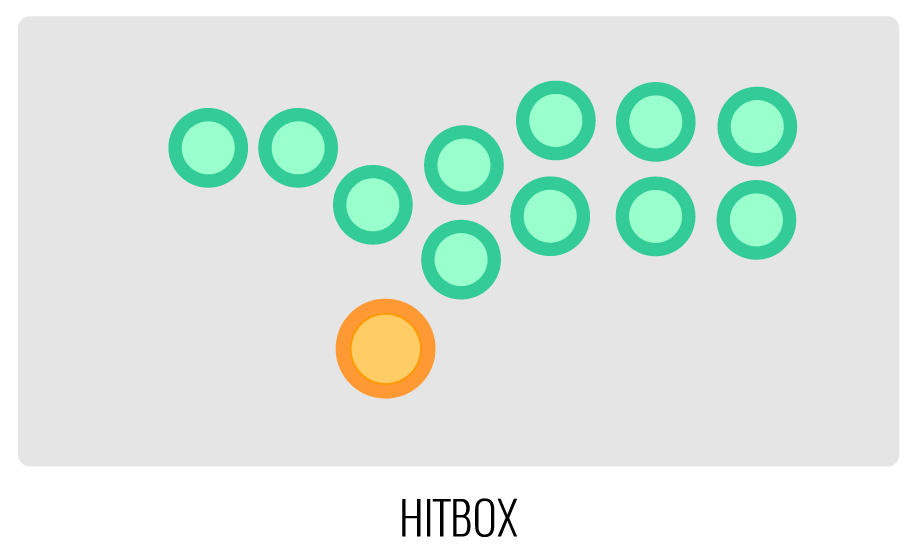
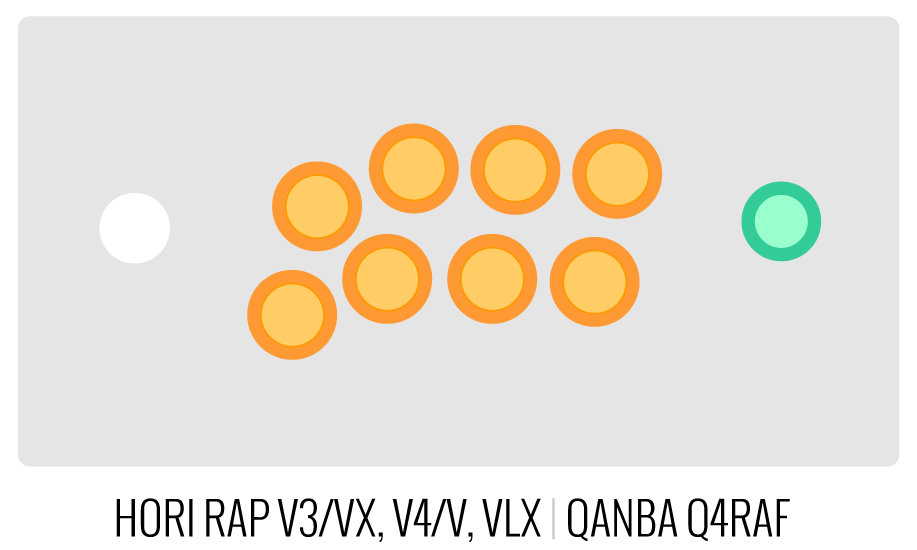
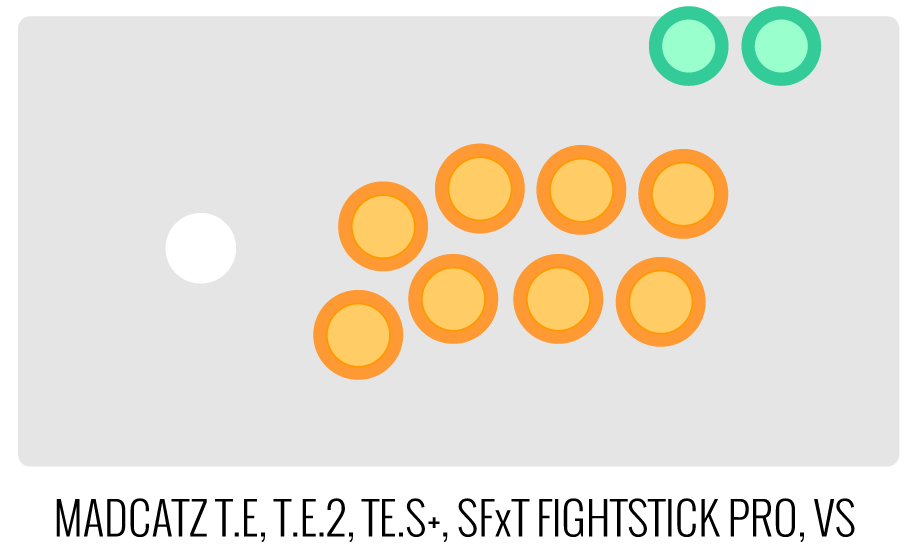
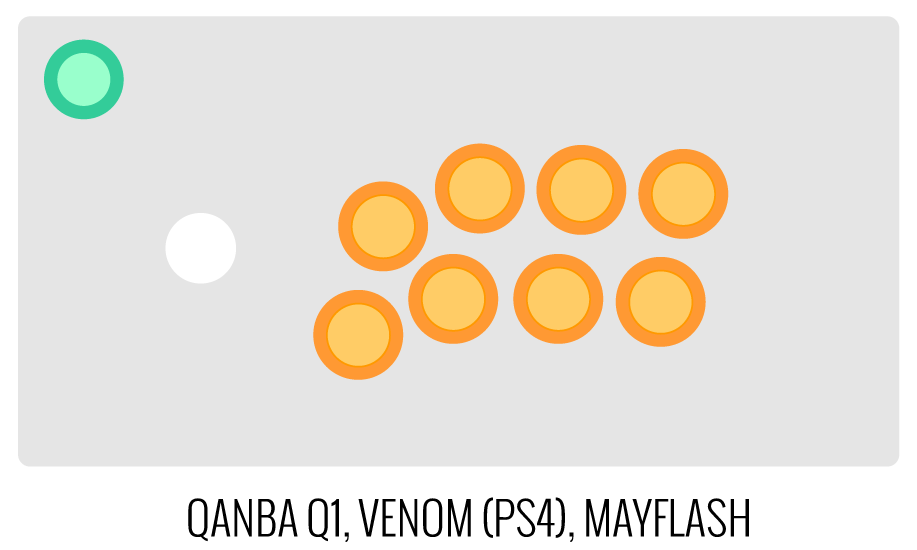
Image Edit If you would like to use a free, online Photoshop-like app to check out whether your artwork will work with a layout we offer, I highly recommend Photopea
 This amazing app works with our PSD templates and is a great way to preview your artwork or create new art files. It also exports to PSD, which is the format we recommend for submitting artwork.
This amazing app works with our PSD templates and is a great way to preview your artwork or create new art files. It also exports to PSD, which is the format we recommend for submitting artwork.Support New to FA Plexworks?
Click the "Options" tab for a detailed explanation of each customization option available to you. Using a mobile device? Click here to scroll to the descriptions.
Artwork templates
We offer a photoshop template for each custom artwork or custom plexi etch. Click the "Description" tab (or scroll up if on mobile device) to display the template and download. You can also click here to access our repository and download artwork and etch templates (in Photoshop PSD format) for your desired model and others.
Important: Using templates outside of the ones we provide may produce unwanted output. We are not responsible for output generated from unsupported templates. More information here.
Warranty and Support for FA Plexworks Custom Order
Custom orders cannot be returned for refund, or exchanged for another custom order. Orders damaged upon arrival are subject to special terms within our return policy. Please see our FA Plexworks FAQ for more information about our Plexworks return policy and related Q&A.
If you have not used our Plexworks custom services before, we recommend that you visit our support section for updated information, helpful tips, and resources to get the best output.
Some useful sections to review before making your purchase (will open in new browser window or tab):
- Learn about our Custom Job Tracker to keep tabs on your custom order while staff processes it from start to finish.
- Save time getting answers by visiting our FAQ.
- Learn more about the personalization options available to you.
- Hire a skilled artist from the Fightstick Artists Network to visualize your idea.
- Handling the artwork yourself? Review our requirements and get tips to optimize your laser etch or artwork submission.
- Learn about additional products and services we offer under FA Plexworks.
Product Reviews
Product Videos
-
 FA Plexworks Custom Fightstick Artwork ServicesThis video explains the many options available to you when cho...
FA Plexworks Custom Fightstick Artwork ServicesThis video explains the many options available to you when cho...
FA Plexworks Custom Fightstick Artwork Services
This video explains the many options available to you when choosing custom FA Plexworks services at focusattack.com. We also cover important tips and references for properly uploading artwork when placing an order. Visit https://www.focusattack.com/customize/ to place an order for custom Fightstick artwork, a replacement acrylic top, or even laser etched design on acrylic. For additional information about FA Plexworks, download templates, and additional tips on how to submit artwork, visit our support portal http://bit.ly/fa-plexworks-support Big thanks to Naota for his pro-tier production! ** Artwork pictures are sample illustrations. All printed artwork is submitted by the user, and not sold directly on the website.Find Similar Products by Category
- Project L Official Artwork: Do not submit the PNG samples. Instead, please download the zipped Photoshop PSD version, unzip the file and integrate them into our artwork templates


